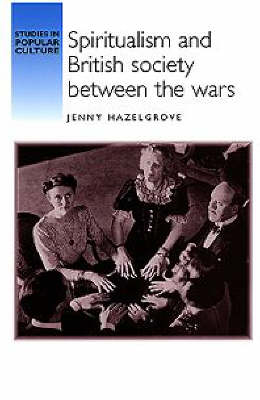
Spiritualism and British Society Between the Wars
Seiten
2000
Manchester University Press (Verlag)
978-0-7190-5559-1 (ISBN)
Manchester University Press (Verlag)
978-0-7190-5559-1 (ISBN)
- Titel ist leider vergriffen;
keine Neuauflage - Artikel merken
Historians of modern British culture have long assumed that interest in spiritualism had faded by the end of the Great War. Jenny Hazelgrove challenges this assumption and shows how spiritualism grew between the wars and became part of the fabric of popular culture.
Historians of modern British culture have long assumed that under pressure from secular forces, interest in spiritualism had faded by the end of the Great War. Jenny Hazelgrove challenges this assumption and shows how spiritualism grew between the wars and became part of the fabric of popular culture. This work provides an insight into an alternative culture that flourished - alongside more conventional outlets for spiritual beliefs and needs. Hazelgrove uses a vast range of primary material from this period, such as films, novels and autobiographies, as well as mass observation surveys to present her case. Hazelgrove suggests that the movement continued to gain in popularity after World War I, and explores the raging contemporary debate over its meaning. By doing this, she engages with issues of gender, subjectivity and power in relation to the development of the image of the medium and of spiritualism in general.
Historians of modern British culture have long assumed that under pressure from secular forces, interest in spiritualism had faded by the end of the Great War. Jenny Hazelgrove challenges this assumption and shows how spiritualism grew between the wars and became part of the fabric of popular culture. This work provides an insight into an alternative culture that flourished - alongside more conventional outlets for spiritual beliefs and needs. Hazelgrove uses a vast range of primary material from this period, such as films, novels and autobiographies, as well as mass observation surveys to present her case. Hazelgrove suggests that the movement continued to gain in popularity after World War I, and explores the raging contemporary debate over its meaning. By doing this, she engages with issues of gender, subjectivity and power in relation to the development of the image of the medium and of spiritualism in general.
Jenny Hazelgrove is a Post-Doctoral Research Fellow at the University of Nottingham and Associate at the Wellcome Institute for the History of Medicine.
Spiritualism after the Great War; Catholic connections; virgin mothers and warrior maids; possession, dissociation and unseen families; mothers. mediums and vampires; frustration, repression and deviant desire; the dual agenda of psychical research; becoming a medium.
| Erscheint lt. Verlag | 15.6.2000 |
|---|---|
| Reihe/Serie | Studies in Popular Culture |
| Mitarbeit |
Index von: Annette Musker |
| Verlagsort | Manchester |
| Sprache | englisch |
| Maße | 156 x 234 mm |
| Themenwelt | Sachbuch/Ratgeber ► Gesundheit / Leben / Psychologie ► Esoterik / Spiritualität |
| Geschichte ► Allgemeine Geschichte ► Neuzeit (bis 1918) | |
| Geschichte ► Allgemeine Geschichte ► 1918 bis 1945 | |
| Geisteswissenschaften ► Geschichte ► Regional- / Ländergeschichte | |
| Geschichte ► Teilgebiete der Geschichte ► Kulturgeschichte | |
| Geschichte ► Teilgebiete der Geschichte ► Sozialgeschichte | |
| Geisteswissenschaften ► Religion / Theologie ► Weitere Religionen | |
| Sozialwissenschaften | |
| ISBN-10 | 0-7190-5559-8 / 0719055598 |
| ISBN-13 | 978-0-7190-5559-1 / 9780719055591 |
| Zustand | Neuware |
| Haben Sie eine Frage zum Produkt? |
Mehr entdecken
aus dem Bereich
aus dem Bereich
Europa 1848/49 und der Kampf für eine neue Welt
Buch | Hardcover (2023)
DVA (Verlag)
48,00 €
Giordano Bruno - ein ketzerisches Leben
Buch | Hardcover (2024)
C.H.Beck (Verlag)
29,90 €


